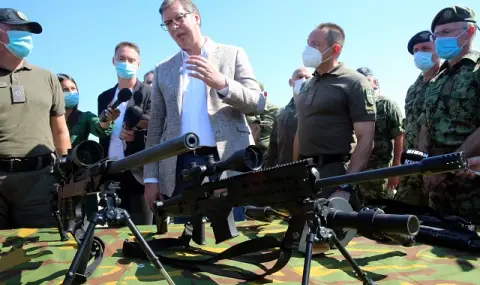In mid-March, Croatia, Albania and Kosovo concluded a military alliance. Serbia and Hungary, in turn, concluded a military alliance. Do the new alliances threaten security in Southeast Europe and increase the risk of war?
The controlled state media in Serbia unanimously praise the agreed military cooperation between Serbia and Hungary: "A bomb that will shake the region", reads the headline of the tabloid Informer. The government newspaper "Kurir" saw the event as a "historical moment", according to "Novosti" it is "new proof of iron friendship", and the portal "Republika" claims that "Croats and Albanians are panicking over the Serbian-Hungarian military alliance".
Whether it is newspapers, television or internet portals: all the strictly state-controlled media outlets trumpeted the news of the military alliance signed in early April in Belgrade by the Hungarian and Serbian defense ministers, Kristof Szalai-Bobrovnicki and Bratislav Gašić. A few days later, Bosnian Serb President Milorad Dodik announced that Republika Srpska in Bosnia and Herzegovina would join the "new military alliance".
What is the agreement between Zagreb, Tirana and Pristina about?
Serbian media on both sides of the Drina River described the new "military pact" in response to the recently agreed military alliance between NATO partners Croatia and Albania, along with Kosovo, whose independence Serbia has not yet recognized. “It is particularly worrying that this military alliance was formed without consultations with Belgrade“, states the position of the Serbian Foreign Ministry. According to it, the agreement “aims to isolate Serbia and create paramilitary structures in Kosovo and is a gross provocation”, we read further in the document.
The agreement, signed on March 18, 2025 by the defense ministers of Croatia, Albania and Kosovo in Tirana, concerns cooperation within the framework of NATO's Strategic Concept and the European Union's security policy. It is intended to strengthen cooperation between the arms industries of the contracting parties, as well as in the training of soldiers and commanding officers. Joint military exercises are also planned, as well as measures to counter foreign cyberattacks and disinformation campaigns.
Regarding Serbia's claims that it is threatened by this new military alliance, Croatian Prime Minister Andrej Plenković assured: “This memorandum of cooperation is not hostile in any way“.
However, the trilateral agreement fuels decades-old national rivalries and animosity between Serbia and Croatia. Including because of statements such as that of Croatian Defense Minister Ivan Anušić, who recalled that the times when Croatia had to ask Belgrade what it can and cannot do are long gone. “This will never happen again“, he said.
The Zagreb newspaper “Jutarnji list“ claims that Serbian President Aleksandar Vučić had a nervous breakdown when he learned about the tripartite agreement. Perhaps this explains the triumphant headlines in the Serbian press: “Croatia and Albania received an express response: Hungary and Serbia sign a military alliance“.
What did Belgrade and Budapest agree on?
Upon closer inspection, this “military alliance“ between Belgrade and Budapest, presented as historic, turns out to be just a political feint for the media controlled by Vučić. “It looks like Vučić's other marketing tricks“, opposition politician Petar Bošković told the opposition Belgrade newspaper “Danas“.
Serbian military expert Aleksandar Radić said: “There are no elements of a military alliance. The pompously announced agreement contains only specific military cooperation projects, which are negotiated annually on the basis of a framework agreement from 2023. Vučić himself also backtracked: "The goal is to create a military alliance," the foundations of which are now being laid.
Is the risk of war in the Western Balkans increasing?
But regardless of the agreed military cooperation (however vague it may be), the countries of the Western Balkans have been accumulating weapons for years. For example, Croatia, which has just reintroduced military service, bought Rafale fighter jets from France and is negotiating the supply of Leopard tanks. Serbia also signed a contract with Paris to purchase multi-role combat aircraft, while also buying weapons systems from Russia and China.
On the occasion of this debate, the Sarajevo newspaper Klix recalled the famous maxim that “The enemy of my enemy is my friend“. And yet - if one looks more closely at the new military alliances, one sees that war in the near future is unlikely. In early April, NATO Secretary General Mark Rutte said that there was no need to put the situation in the region on the agenda of the meeting of NATO foreign ministers in Brussels. His predecessor Jens Stoltenberg also claimed that there was no direct military threat.
“The chance of a real war breaking out“ is small,“ says Vuk Vukasanović of the Center for Security Policy in Belgrade. Despite rearmament, the countries will not have enough resources for such a conflict, and local elites in particular will have to fear for their positions of power in the event of war.
NATO is in control
In addition, NATO has a strong presence in the region. Apart from Kosovo, all of Serbia's neighboring countries and Bosnia/Herzegovina are members of the Alliance. The United States has a large military base in Kosovo - Camp Bondsteel. The Romanian Mihail Kogalniceanu air base near Constanta is currently being expanded to become the largest NATO base in Europe by area for 10,000 soldiers. A large naval base has long been planned in the port of Durres on the Albanian Adriatic coast. In this situation, waging war against this military power would be tantamount to hara-kiri.
